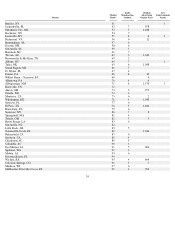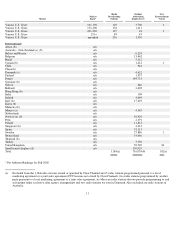iHeartMedia 2002 Annual Report Download - page 20
Download and view the complete annual report
Please find page 20 of the 2002 iHeartMedia annual report below. You can navigate through the pages in the report by either clicking on the pages listed below, or by using the keyword search tool below to find specific information within the annual report.
Exchange Rates May Cause Future Losses in Our International Operations
Because we own assets overseas and derive revenues from our international operations, we may incur currency translation losses due to
changes in the values of foreign currencies and in the value of the U.S. dollar. We cannot predict the effect of exchange rate fluctuations upon
future operating results. We currently maintain no derivative instruments to reduce the exposure to translation or transaction risk.
Extensive Government Regulation May Limit Our Broadcasting Operations
The federal government extensively regulates the domestic broadcasting industry, and any changes in the current regulatory scheme could
significantly affect us. Our broadcasting businesses depend upon maintaining broadcasting licenses issued by the FCC for maximum terms of
eight years. Renewals of broadcasting licenses can be attained only through the FCC’s grant of appropriate applications. Although the FCC
rarely denies a renewal application, the FCC could deny future renewal applications resulting in the loss of one or more of our broadcasting
licenses.
The federal communications laws limit the number of broadcasting properties we may own in a particular area. While the
Telecommunications Act of 1996 relaxed the FCC’s multiple ownership limits, any subsequent modifications that tighten those limits could
make it impossible for us to complete potential acquisitions or require us to divest stations we have already acquired. For instance, the FCC has
adopted modified rules that in some cases permit a company to own fewer radio stations than allowed by the Telecommunications Act of 1996
in markets or geographical areas where the company also owns television stations. These modified rules could require us to divest radio
stations we currently own in markets or areas where we also own television stations.
Moreover, changes in governmental regulations and policies may have a material impact on us. For example, we currently provide
programming to several television stations we do not own and receive programming from other parties for certain television stations we do
own. These programming arrangements are made through contracts known as local marketing agreements. The FCC has recently revised its
rules and policies regarding television local marketing agreements. These revisions will restrict our ability to enter into television local
marketing agreements in the future, and may eventually require us to terminate our programming arrangements under existing local marketing
agreements. Additionally, the FCC has adopted rules which under certain circumstances subject previously nonattributable debt and equity
interests in communications media to the FCC’s multiple ownership restrictions. These rules may limit our ability to expand our media
holdings. Also, the FCC has recently instituted a proceeding to reexamine comprehensively all of its media ownership rules. This omnibus
proceeding incorporates, among other things, a preexisting FCC proceding to consider a broad range of possible changes may limit our ability
to make future broadcasting acquisitions, and may eventually require us to terminate existing agreements whereby we provide programming to
our sell advertising on stations we do not own. Additionally, under an interim policy announced by the FCC in connection with its proceeding
to modify the radio ownership rules, the FCC could designate for hearing or significantly delay approval of certain of our pending radio
acquisitions which, in the FCC’s view, raise local market concentration concerns.
20
•restrictions on the withdrawal of foreign investment and earnings;
•government policies against businesses owned by foreigners;
•investment restrictions or requirements;
•expropriations of property;
•the potential instability of foreign governments;
•the risk of insurrections;
•risks of renegotiation or modification of existing agreements with governmental authorities;
•foreign exchange restrictions;
•withholding and other taxes on remittances and other payments by subsidiaries; and
•changes in taxation structure.
























